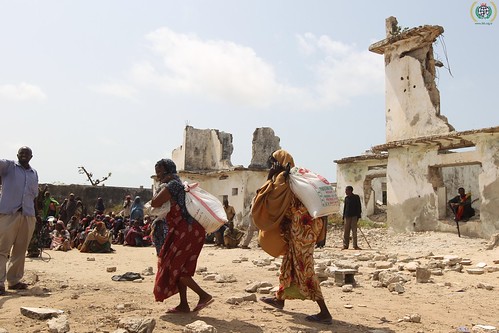Somalia expert
Ken Menkhaus wrote a policy brief in September 2011 for the Enough Project titled “A Diplomatic Surge to Stop Somalia’s Famine.” Menkhaus noted that 70 percent of Somali famine victims reside in the countryside where al-Shabaab blocks most aid agencies and severely curtails the activities of the few that remain. Al-Shabaab’s leadership has denied that famine exists, views food aid as a western conspiracy to undermine Somali farmers and tries to block famine victims from fleeing to areas where food aid is available.
 |
| Flickr/IHH Humanitarian Relief Foundation/TURKEY |
He argues that both al-Shabaab and the Transitional Federal Government (TFG) must be put under the most intense diplomatic pressure the world can muster, led by eminent global figures and politicians from the Islamic world, Africa, the West and beyond. It must include mobilization of Somali, Islamic and western civil society groups who can bring pressure to bear on their own governments to make this a top priority and, where appropriate, press the TFG and al-Shabaab. The strategy requires equal political pressure on the TFG and al-Shabaab. Menkhaus calls on the United States to take the lead in this initiative.
To my mind, this strategy has a major flaw. While there are many points of leverage for dealing with the TFG, which is not the primary problem, there are very few for dealing with al-Shabaab. I don’t know of any nation state that has any leverage over al-Shabaab. While there are a few Islamic NGOs that are engaging with al-Shabaab, none has any real influence with the extremist group. Individual Somali business persons do have some leverage and perhaps a small number of foreign Islamic religious figures and scholars could influence al-Shabaab, but the United States is in a weak position to organize these forces into a diplomatic surge and I doubt that these limited points of leverage constitute a surge in any event.
You may have a different reaction to the policy brief so I suggest you read Menhhaus’
full report.




